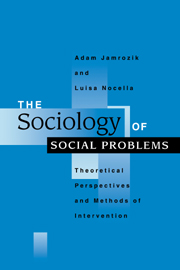Book contents
- Frontmatter
- Contents
- List of Tables
- List of Figures
- Preface and Acknowledgements
- 1 Introduction: Theoretical Perspectives on Social Problems
- 2 Contemporary Perspectives on Social Problems
- 3 Methods of Intervention in Social Problems
- 4 Social Actors in Social Problems
- 5 Challenges of Contemporary Social Problems
- 6 Social Problems in the Residualist Conversion Perspective
- 7 Inequality – The Underlying Universal Issue in Social Problems
- 8 The Social Construction of Family Problems
- 9 The Problem of Social Order
- 10 The Theory of Residualist Conversion: Does it Meet the Test?
- 11 Conclusions and Implications
- Bibliography
- Index
11 - Conclusions and Implications
Published online by Cambridge University Press: 29 March 2011
- Frontmatter
- Contents
- List of Tables
- List of Figures
- Preface and Acknowledgements
- 1 Introduction: Theoretical Perspectives on Social Problems
- 2 Contemporary Perspectives on Social Problems
- 3 Methods of Intervention in Social Problems
- 4 Social Actors in Social Problems
- 5 Challenges of Contemporary Social Problems
- 6 Social Problems in the Residualist Conversion Perspective
- 7 Inequality – The Underlying Universal Issue in Social Problems
- 8 The Social Construction of Family Problems
- 9 The Problem of Social Order
- 10 The Theory of Residualist Conversion: Does it Meet the Test?
- 11 Conclusions and Implications
- Bibliography
- Index
Summary
In writing this book, we have presented a theoretical perspective on social problems, which we think offers a framework for potentially fruitful sociological analyses of social problems, as well as a framework for more effective methods of intervention in social problems. This concluding chapter addresses some wider issues arising out of the causal relationship between society's pursuit of certain values and desirable goals, and the negative outcomes in the form of social problems that arise from such pursuits. We also attempt to identify from this causal relationship some implications for governments and for their policies of resource allocation, and to emphasise the benefits and corresponding costs of the promotion of certain values and corresponding goals. In pointing out that social problems constitute logical residual outcomes of the pursuit of certain values, interests and corresponding goals, our conclusion also indicates the need for the introduction of policies and methods of intervention that would be logically linked to the causative factors in social problems.
Times of Transition to the Unknown
Postindustrialism, post-Fordism, poststructuralism, postmodernism – all these terms suggest the end of a period, the exhaustion of ideas, and a transition to an unknown future. The extent of the unknown is so great that we have not yet found a name for it. It is a period of uncertainty, a period of unease.
The response in the social organisation of industrialised countries to this uncertainty is not so much a form of ‘back to the future’, but rather ‘forward to the past’.
- Type
- Chapter
- Information
- The Sociology of Social ProblemsTheoretical Perspectives and Methods of Intervention, pp. 214 - 219Publisher: Cambridge University PressPrint publication year: 1998



